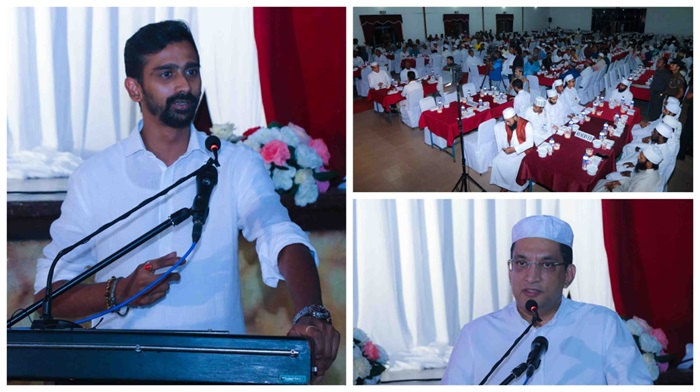
Minister of Water Supply and Estate Infrastructure Development, Jeevan Thondaman has extended his apologies to the Muslim community for the mandatory cremation policy enforced during the COVID-19 pandemic under the previous Government of Gotabaya Rajapaksa.
The apology came during an Ifthar gathering held in Hatton town on Tuesday (Apr 02), hosted by Minister Thondaman, during which he acknowledged the distress the policy had caused among the Muslim community.
Although having assumed duties in January last year, the minister said it was still important that as the present Minister responsible for water, to take responsibility irrespective of who was in his place before.
Minister Thondaman added that he will soon be submitting a Cabinet paper together with the findings of the study to seek a formal apology from the Government for the harm and hurt caused to especially the Muslim community by the forced cremation policy.
According to a statement from Minister Jeevan Thondaman’s Office, the forced creation policy under President Gotabaya Rajapaksa was driven by concerns that the burial of COVID-19 victims could contaminate water supplies. This was despite several scientific opinions, including that of the World Health Organisation, refuting that claim.
The previous Government’s position has now been challenged and refuted by new scientific findings of a study led by experts from the University of Sri Jayewardenepura and an update to it by the Joint Research and Demonstration Centre for Water Technology (JRDC) at the University of Peradeniya, a centre under the Ministry of Water Supply and Estate Infrastructure Development, he said. The update to the original study was done on the instructions of Minister Thondaman after becoming the subject Minister last year.
The first study, led by experts from the University of Sri Jayewardenepura and financially supported by the Ministry of Water Supply, investigated the presence of the SARS-CoV-2 virus in surface and wastewater across various locations in Sri Lanka. Conducted between August and December 2021, this research aimed to assess the risk of viral transmission through water, a concern that originally motivated the cremation mandate.
Complementing this, a comprehensive review study by the JRDC analysed the effects of COVID-19-infected bodies’ burial on groundwater contamination. Published this year (2024), this review concluded there was no risk to groundwater pollution from properly conducted burials during the pandemic. The study emphasised that proper burial procedures, including deep burial in sealed body bags, effectively mitigated any risk of environmental contamination.
The study also highlighted that the presence of SARS-CoV-2 RNA in various water sources did not stem from burial practices but rather from the faeces and urine of infected individuals, further debunking the initial assumptions that underpinned the cremation policy.
Minister Thondaman’s apology marks a critical step towards healing the wounds inflicted by the pandemic’s divisive policies, reaffirming the Government’s dedication to evidence-based decision-making and respect for all cultural and religious practices in Sri Lanka. (NewsWire)
